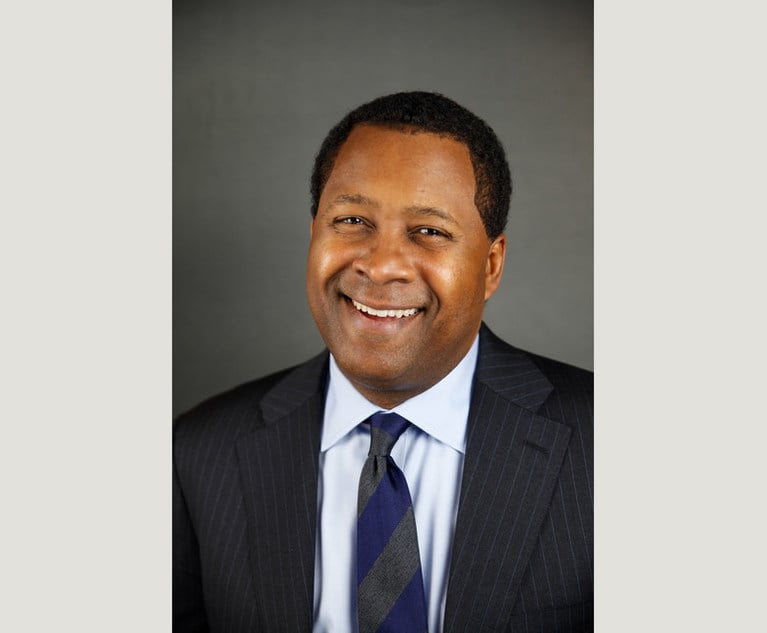Compliance Hot Spots: Grilling 'Megabank' CEOs | Global Corruption Risks | More FARA Registrations | White-Collar Moves
Seven chief executives of major US banks will face US House Financial Services members today, and we'll be watching. Plus: a new report looks at global corruption risks, and scroll down for Who Got the Work. Thanks for reading!
April 09, 2019 at 09:00 PM
10 minute read
Seven top bank executives head to House Financial Services tomorrow—any Rep. Katie Porter surprises? Plus: A Duke Law prof looks at declining corporate prosecutions, and scroll down for Who Got the Work. And notable moves is teeming this week. Thanks for reading Compliance Hot Spots. Tips, feedback and general musings on your practices are welcome. I'm at [email protected]and 202-828-0315, or follow me on Twitter @cryanbarber.

Bank Execs Head to Hot Seat
From the time they retook the majority, U.S. House Democrats have proven that their oversight interests are not confined to the administration of President Donald Trump.
Just ask the pharmaceutical industry, which has come under a House investigation into rising drug prices. And ask Wells Fargo, whose now-former CEO stepped down late last month—not long after lawmakers made only their latest calls for his resignation.
Tomorrow morning, seven other top executives of the country's biggest banks will take their turns before the House Financial Services Committee—at a hearing titled “Holding Megabanks Accountable: A Review of Global Systemically Important Banks 10 years after the Financial Crisis.”
The executives are prepared to say “the U.S. economy is strong and Wall Street has reformed practices that contributed to the financial crisis a decade ago,” Reuters reported.
The hearing will mark the first time since the financial crisis that the largest banks have appeared together before Congress. Their Capitol Hill reunion comes at a charged time—and with the distinct possibility of public humiliation.
All eyes will be on the House committee's powerful chairwoman, U.S. Rep. Maxine Waters, and freshman U.S. Rep. Alexandra Ocasio-Cortez. But, as they livestream tomorrow's hearing inside their law firm offices, members of the congressional investigations bar will be listening for the voice of another first-term Democrat: U.S. Rep. Katie Porter.
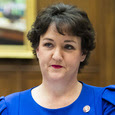 Porter (at left) has been living rent-free in the minds of those lawyers after going viral with her questioning of Equifax CEO Mark Begor and Tim Sloan, at the time Wells Fargo's chief executive. In both instances, drawing no doubt on her experience as a law professor, she pointed to arguments the companies had raised in court that appeared to counter what the top executives were saying in the hearing room.
Porter (at left) has been living rent-free in the minds of those lawyers after going viral with her questioning of Equifax CEO Mark Begor and Tim Sloan, at the time Wells Fargo's chief executive. In both instances, drawing no doubt on her experience as a law professor, she pointed to arguments the companies had raised in court that appeared to counter what the top executives were saying in the hearing room.
Lawyers have taken notice—and been forced to dig deeper preparing executives.
“It means that we all have to think ahead in that same way and think about what has a company been saying in litigation. It just means more preparation time, just more homework,” said Amy Jeffress, a partner at Arnold & Porter, during an appearance on an American Bar Association panel last month.
>> Here are the names of the chief executives testifying, and links to their prepared statements:
Michael Corbat of Citigroup; James Dimon of JPMorgan Chase & Co.; James Gorman of Morgan Stanley; Brian Moynihan of Bank of America; Ronald O'Hanley of State Street Corporation; Charles Scharf of Bank of New York Mellon; and David Solomon of Goldman Sachs.
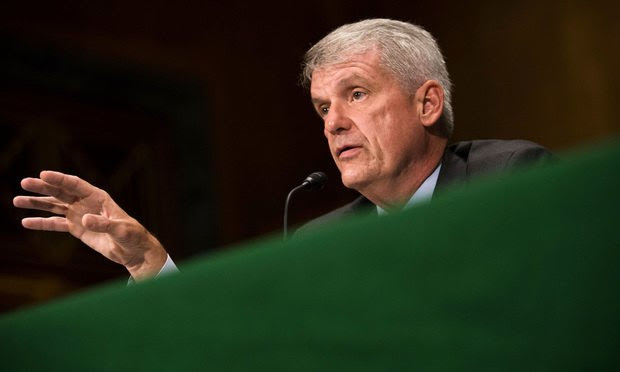
Compliance Headlines: What We're Reading
>> How Wells Fargo's Regulators and Employees Drove Out Its CEO. “The day after former Wells Fargo & Co Chief Executive Tim Sloan (above) told U.S. lawmakers he was transforming the bank's high-pressure culture, Federal Reserve officials met privately with bank employees.” [Reuters]
>> How Regulators, Republicans and Big Banks Fought for a Big Increase in Lucrative but Risky Corporate Loans. “This tension between easy money and unknown risks has flummoxed some of the very officials who have allowed the lending binge to heat up since 2017. In an appendix to its annual budget, White House officials in March touched on both the benefit of leveraged loans and the potential that they could cause a repeat of the financial crisis in 2008 and 2009.” [The Washington Post]
>> Survey: Companies Seek Both 'Soft,' Technical Skills in Compliance Hiring. “Among 109 respondents who are responsible for making hiring-related decisions for their organizations, the top leadership skills they cited as most important for a compliance officer's repertoire include creative problem-solving; flexibility/adaptability; people management; and diplomacy. Only 14 percent cited public speaking as a necessary skill.” [Compliance Week]
>> Declining Corporate Prosecutions. “Ten years ago, people across the U.S. protested that “too big to jail” banks were not held accountable after the financial crisis. Little has changed. Two years into the Trump Administration, newly collected data allows one to assess what impact a series of new policies have had on corporate enforcement,” Brandon Garrett of Duke University Law School writes. [American Criminal Law Review]
 >> Orrick Partner Richard Morvillo on Corporate Criminal Defense in the Age of the Deferred Prosecution Agreement. Morvillo (at left) represented Lumber Liquidators in a recent Justice Department settlement. “We showed them exactly what we had done in terms of educating our employees, building out a compliance structure. We brought in a new compliance officer. We brought in a new general counsel. We began programs for our vendors so that they would understand their obligations and where those obligations intersected with ours. We committed to a robust compliance program. We expanded the committees of the board of directors and created a compliance committee.” [Corporate Crime Reporter]
>> Orrick Partner Richard Morvillo on Corporate Criminal Defense in the Age of the Deferred Prosecution Agreement. Morvillo (at left) represented Lumber Liquidators in a recent Justice Department settlement. “We showed them exactly what we had done in terms of educating our employees, building out a compliance structure. We brought in a new compliance officer. We brought in a new general counsel. We began programs for our vendors so that they would understand their obligations and where those obligations intersected with ours. We committed to a robust compliance program. We expanded the committees of the board of directors and created a compliance committee.” [Corporate Crime Reporter]
>> After Hundreds of Crashes, This Britax Jogging Stroller Faced Recall. Then Trump Appointees Stepped In. “The untold story of the Britax case shows how changes in the safety agency's leadership under President Trump influenced the handling of a product that the commission believed had injured consumers. The case was even more striking because it unfolded as Republicans assumed day-to-day control of the agency, eventually earning a majority on the agency's oversight commission for the first time in more than a decade.” [The Washington Post]
>> A Day of Reckoning for Tech Giants? Here's Another View. Hogan Lovells partner Logan Breed is among those antitrust lawyers who think the Federal Trade Commission's task force will trouble the technology giants, my colleague MP McQueen reports. Also, in another sign the FTC is flexing its regulatory muscles, the trade commission has sent letters to seven big internet service providers demanding information on their data collection and privacy practices. [Corporate Counsel]
>> Report Ranks Global Industries With the Highest Corruption Risks. “Global companies operating in the construction industry face a minefield of corruption threats, according to a new report that ranks industries and countries based on the compliance risk challenges they pose to foreign investors,” my colleague Phillip Bantz reports. The construction industry has become “the frontier right now on corruption and bribery and fraud enforcement,” Alston & Bird partner Paul Monnin has said. [Law.com]
>> DOJ Must Explain FCA Dismissals, Judge Rules. “The decision to dismiss this case is rationally related to the valid governmental purpose of preserving resources for other litigation and protecting the government's healthcare programs,” U.S. District Judge Timothy Savage of the Eastern District of Pennsylvania wrote in a ruling April 3. Savage continued: “The reasons given by the government are not a cover for an illegitimate reason and do not mask an animus toward the corporate relator. They are concerns that any party to litigation may have when deciding whether to continue pursuing a case. The government is entitled to do a cost / benefit analysis to decide whether to pursue a case, even a meritorious one.” [Law360]
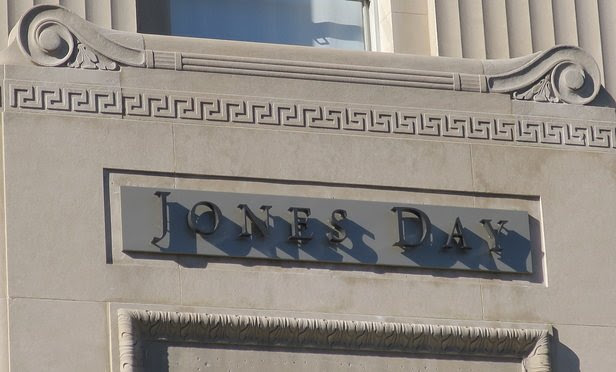
Who Got the Work
>> Jones Day partner Samir Jain registered to lobby for Chinese telecom Huawei Technologies. Jones Day, working with a team from Morgan, Lewis & Bockius, represents the company in a Texas federal court suit challenging U.S. sanctions. The new lobby registration says Jain will focus on “foreign investment, government purchasing, and security-related issues arising under the National Defense Authorization Act.” Jain formerly served as senior director for cybersecurity policy at the National Security Council in 2016, and earlier he was a top Obama-era U.S. Justice Department lawyer.
>> Latham & Watkins partner William McGlone in Washington, co-chair of the firm's export controls, economic sanctions and customs practice, represents Lord Gregory Barker of Battle, according to newly filed papers submitted through the Foreign Agents Registration Act. The firm, charging a flat fee of $25,000, is representing Lord Barker “as chairman and independent director of En+, in certain meetings and communications with members of Congress and their staffs to help explain certain legal and technical elements of your plan to eliminate majority ownership and control of En+ by Oleg Deripaska, a sanctioned person.”
>> Mark Horwitz of Orlando's Horwitz & Citro represents Paul Powers, the former associate general counsel of Orlando-based SeaWorld Entertainment Inc. who has pleaded guilty to one count of insider trading. The U.S. Justice Department said Tuesday that Powers will be sentenced before U.S. District Judge Carlos Mendoza of the Middle District of Florida. A date has not been set. The SEC filed a parallel complaint arising out of the same alleged conduct.

Notable Moves & Announcements
• White-collar partners Matthew Herrington and Tom Best are joining Paul Hastings in Washington from Steptoe & Johnson LLP, my colleague Dan Packel reports. Herrington had arrived at Steptoe as a partner in 2004 from Williams & Connolly and Best arrived the next year as an associate after a short spell at Skadden, Arps, Slate, Meagher & Flom.
 • Lisa Zornberg (at left), former chief of the criminal division at the U.S. Attorney's Office in the Southern District of New York, is set to join Debevoise & Plimpton. My colleague Jack Newsham says Zornberg “will join several former colleagues from the top ranks of U.S. law enforcement in the firm's white-collar defense and investigations practice.” Zornberg said in an interview: “When I decided to leave public service, there was a very short list of firms I considered. Debevoise was at the top, and the basic reason is that its white-collar and regulatory defense group is second to none.”
• Lisa Zornberg (at left), former chief of the criminal division at the U.S. Attorney's Office in the Southern District of New York, is set to join Debevoise & Plimpton. My colleague Jack Newsham says Zornberg “will join several former colleagues from the top ranks of U.S. law enforcement in the firm's white-collar defense and investigations practice.” Zornberg said in an interview: “When I decided to leave public service, there was a very short list of firms I considered. Debevoise was at the top, and the basic reason is that its white-collar and regulatory defense group is second to none.”
• Paul Blankenstein is jumping from Gibson, Dunn & Crutcher to join Sanford Heisler Sharp as a partner in the firm's Washington office, where he will co-chair the financial services litigation practice. Blankenstein had been of counsel at Gibson Dunn, where he had practiced for more than 30 years.
• Samuel Ramer has left the White House counsel's office for Norton Rose Fulbright in Washington, D.C., my colleague Ryan Lovelace reports. Ramer had been senior associate counsel to President Trump since December 2017.
• Former SEC senior counsel Bill Martin has joined O'Melveny & Myers in New York as counsel. He arrives from the SEC's New York office, where he was a member of the market abuse unit and investigated and prosecuted insider trading.
• Sean Prosser, a former SEC enforcement attorney, has joined Mintz, Levin, Cohn, Ferris, Glovsky and Popeo as a member in the litigation department. Prosser arrives from Perkins Coie, where he led the white-collar, government investigations and securities litigation practices in Southern California.
• Sheppard, Mullin, Richter & Hampton hired Thomas Dillickrath in Washington as a partner in the antitrust and competition practice group. Dillickrath joins from the Federal Trade Commission, where he served as deputy chief trial counsel in the bureau of competition.
• Hunter Wiggins has left Jones Day to become chief of staff at the Illinois Department of Financial and Professional Regulation, working under Secretary Deborah Hagan. Wiggins joined Jones Day as a partner in 2016 after serving as the principal deputy enforcement director at the Consumer Financial Protection Bureau.
This content has been archived. It is available through our partners, LexisNexis® and Bloomberg Law.
To view this content, please continue to their sites.
Not a Lexis Subscriber?
Subscribe Now
Not a Bloomberg Law Subscriber?
Subscribe Now
NOT FOR REPRINT
© 2025 ALM Global, LLC, All Rights Reserved. Request academic re-use from www.copyright.com. All other uses, submit a request to [email protected]. For more information visit Asset & Logo Licensing.
You Might Like
View All
Compliance Hot Spots: GOP Eyes ESG as an Antitrust Issue + Another DOJ Crypto Seizure + Sidley Partner Jumps to Main Justice
9 minute read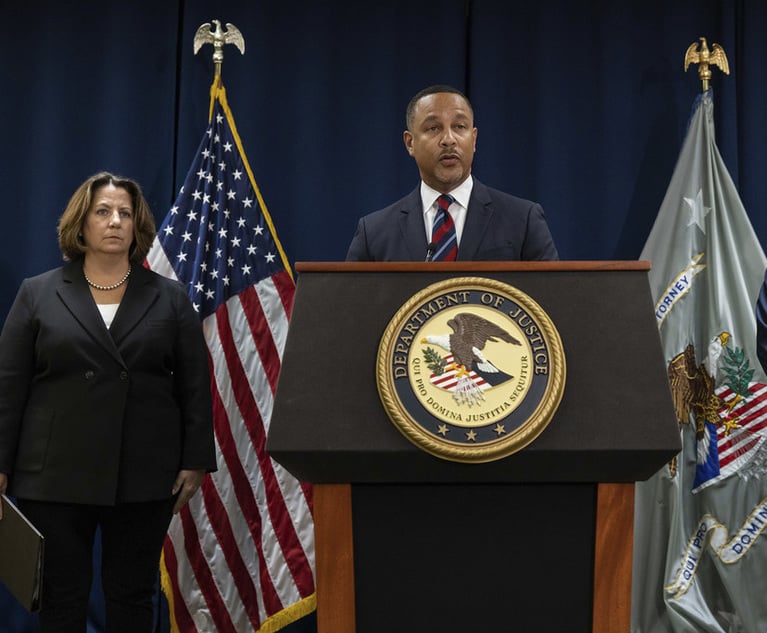
Compliance Hot Spots: Lessons from Lafarge + Fraud Section Chief Talks Compliance + Cravath Lands FTC Commissioner
11 minute readTrending Stories
- 1New York State Authorizes Stand-Alone Business Interruption Insurance Policies
- 2Buyer Beware: Continuity of Coverage in Legal Malpractice Insurance
- 3‘Listen, Listen, Listen’: Some Practice Tips From Judges in the Oakland Federal Courthouse
- 4BCLP Joins Saudi Legal Market with Plans to Open Two Offices
- 5White & Case Crosses $4M in PEP, $3B in Revenue in 'Breakthrough Year'
Who Got The Work
J. Brugh Lower of Gibbons has entered an appearance for industrial equipment supplier Devco Corporation in a pending trademark infringement lawsuit. The suit, accusing the defendant of selling knock-off Graco products, was filed Dec. 18 in New Jersey District Court by Rivkin Radler on behalf of Graco Inc. and Graco Minnesota. The case, assigned to U.S. District Judge Zahid N. Quraishi, is 3:24-cv-11294, Graco Inc. et al v. Devco Corporation.
Who Got The Work
Rebecca Maller-Stein and Kent A. Yalowitz of Arnold & Porter Kaye Scholer have entered their appearances for Hanaco Venture Capital and its executives, Lior Prosor and David Frankel, in a pending securities lawsuit. The action, filed on Dec. 24 in New York Southern District Court by Zell, Aron & Co. on behalf of Goldeneye Advisors, accuses the defendants of negligently and fraudulently managing the plaintiff's $1 million investment. The case, assigned to U.S. District Judge Vernon S. Broderick, is 1:24-cv-09918, Goldeneye Advisors, LLC v. Hanaco Venture Capital, Ltd. et al.
Who Got The Work
Attorneys from A&O Shearman has stepped in as defense counsel for Toronto-Dominion Bank and other defendants in a pending securities class action. The suit, filed Dec. 11 in New York Southern District Court by Bleichmar Fonti & Auld, accuses the defendants of concealing the bank's 'pervasive' deficiencies in regards to its compliance with the Bank Secrecy Act and the quality of its anti-money laundering controls. The case, assigned to U.S. District Judge Arun Subramanian, is 1:24-cv-09445, Gonzalez v. The Toronto-Dominion Bank et al.
Who Got The Work
Crown Castle International, a Pennsylvania company providing shared communications infrastructure, has turned to Luke D. Wolf of Gordon Rees Scully Mansukhani to fend off a pending breach-of-contract lawsuit. The court action, filed Nov. 25 in Michigan Eastern District Court by Hooper Hathaway PC on behalf of The Town Residences LLC, accuses Crown Castle of failing to transfer approximately $30,000 in utility payments from T-Mobile in breach of a roof-top lease and assignment agreement. The case, assigned to U.S. District Judge Susan K. Declercq, is 2:24-cv-13131, The Town Residences LLC v. T-Mobile US, Inc. et al.
Who Got The Work
Wilfred P. Coronato and Daniel M. Schwartz of McCarter & English have stepped in as defense counsel to Electrolux Home Products Inc. in a pending product liability lawsuit. The court action, filed Nov. 26 in New York Eastern District Court by Poulos Lopiccolo PC and Nagel Rice LLP on behalf of David Stern, alleges that the defendant's refrigerators’ drawers and shelving repeatedly break and fall apart within months after purchase. The case, assigned to U.S. District Judge Joan M. Azrack, is 2:24-cv-08204, Stern v. Electrolux Home Products, Inc.
Featured Firms
Law Offices of Gary Martin Hays & Associates, P.C.
(470) 294-1674
Law Offices of Mark E. Salomone
(857) 444-6468
Smith & Hassler
(713) 739-1250




